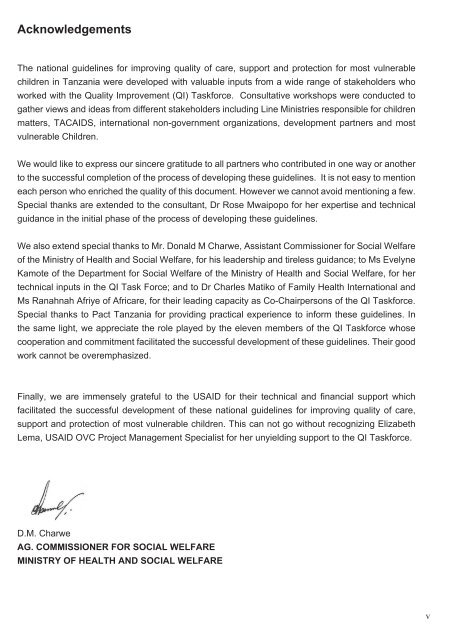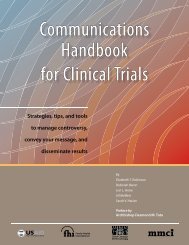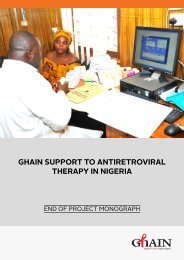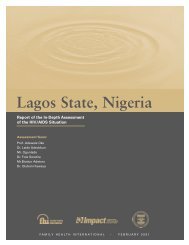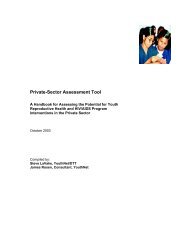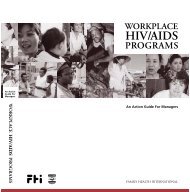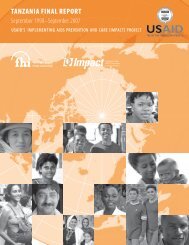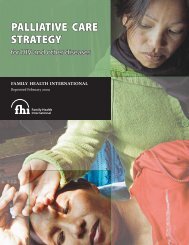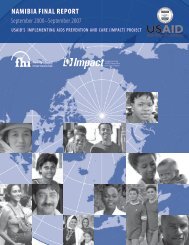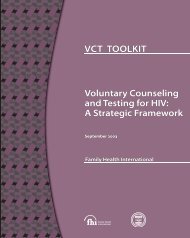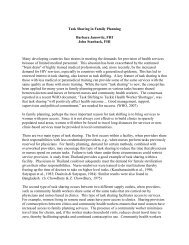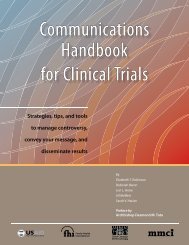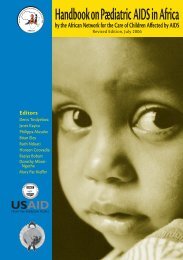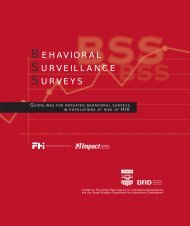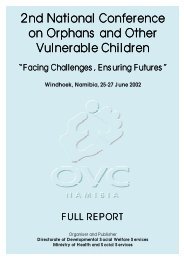National Guidelines for Improving Quality of Care, Support ... - FHI 360
National Guidelines for Improving Quality of Care, Support ... - FHI 360
National Guidelines for Improving Quality of Care, Support ... - FHI 360
Create successful ePaper yourself
Turn your PDF publications into a flip-book with our unique Google optimized e-Paper software.
Acknowledgements<br />
The national guidelines <strong>for</strong> improving quality <strong>of</strong> care, support and protection <strong>for</strong> most vulnerable<br />
children in Tanzania were developed with valuable inputs from a wide range <strong>of</strong> stakeholders who<br />
worked with the <strong>Quality</strong> Improvement (QI) Task<strong>for</strong>ce. Consultative workshops were conducted to<br />
gather views and ideas from different stakeholders including Line Ministries responsible <strong>for</strong> children<br />
matters, TACAIDS, international non-government organizations, development partners and most<br />
vulnerable Children.<br />
We would like to express our sincere gratitude to all partners who contributed in one way or another<br />
to the successful completion <strong>of</strong> the process <strong>of</strong> developing these guidelines. It is not easy to mention<br />
each person who enriched the quality <strong>of</strong> this document. However we cannot avoid mentioning a few.<br />
Special thanks are extended to the consultant, Dr Rose Mwaipopo <strong>for</strong> her expertise and technical<br />
guidance in the initial phase <strong>of</strong> the process <strong>of</strong> developing these guidelines.<br />
We also extend special thanks to Mr. Donald M Charwe, Assistant Commissioner <strong>for</strong> Social Welfare<br />
<strong>of</strong> the Ministry <strong>of</strong> Health and Social Welfare, <strong>for</strong> his leadership and tireless guidance; to Ms Evelyne<br />
Kamote <strong>of</strong> the Department <strong>for</strong> Social Welfare <strong>of</strong> the Ministry <strong>of</strong> Health and Social Welfare, <strong>for</strong> her<br />
technical inputs in the QI Task Force; and to Dr Charles Matiko <strong>of</strong> Family Health International and<br />
Ms Ranahnah Afriye <strong>of</strong> Africare, <strong>for</strong> their leading capacity as Co-Chairpersons <strong>of</strong> the QI Task<strong>for</strong>ce.<br />
Special thanks to Pact Tanzania <strong>for</strong> providing practical experience to in<strong>for</strong>m these guidelines. In<br />
the same light, we appreciate the role played by the eleven members <strong>of</strong> the QI Task<strong>for</strong>ce whose<br />
cooperation and commitment facilitated the successful development <strong>of</strong> these guidelines. Their good<br />
work cannot be overemphasized.<br />
Finally, we are immensely grateful to the USAID <strong>for</strong> their technical and financial support which<br />
facilitated the successful development <strong>of</strong> these national guidelines <strong>for</strong> improving quality <strong>of</strong> care,<br />
support and protection <strong>of</strong> most vulnerable children. This can not go without recognizing Elizabeth<br />
Lema, USAID OVC Project Management Specialist <strong>for</strong> her unyielding support to the QI Task<strong>for</strong>ce.<br />
D.M. Charwe<br />
AG. COMMISSIONER FOR SOCIAL WELFARE<br />
MINISTRY OF HEALTH AND SOCIAL WELFARE<br />
v


